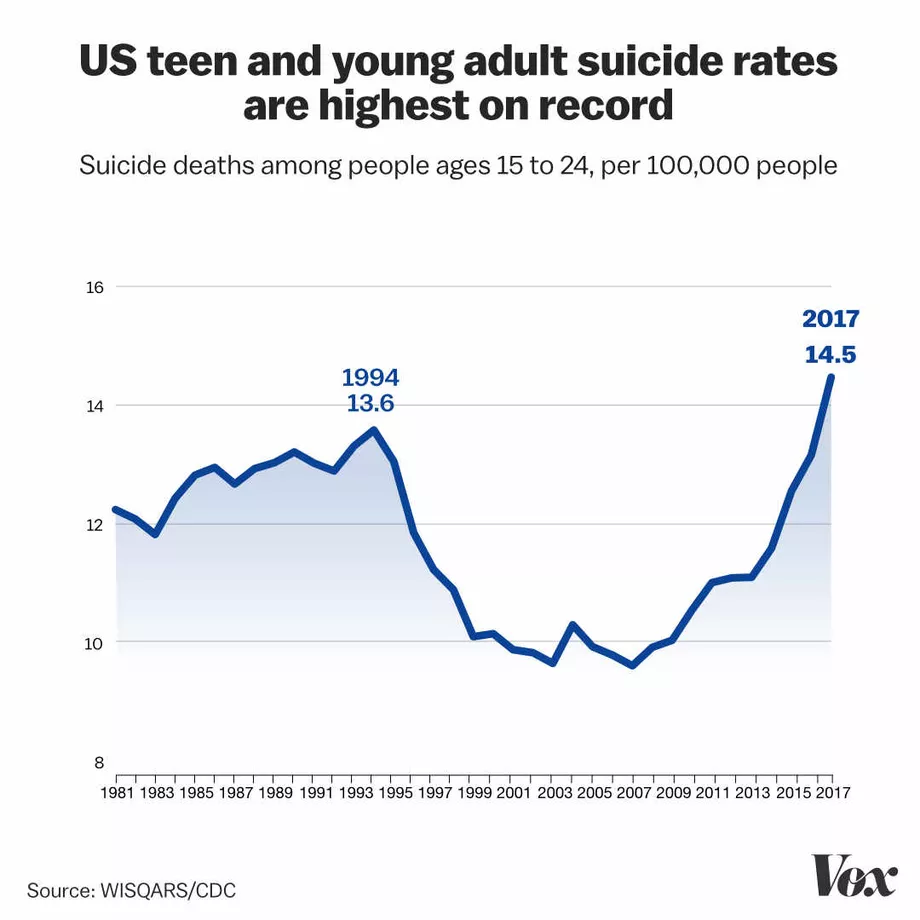Rise of Mental Illnesses
- Home /
- Rise of Mental Illnesses
The Suicide Epidemic
Y ou may have heard a little bit about this, but there is currently an ongoing worldwide mental health crisis. Now, if you haven't heard about his, you may be wonder what exactly this means. No one can even blame you for that—this epidemic is not receiving nearly enough press coverage. See, depression and suicide rates have risen heavily over the past few years, in all people groups. However, there's one group whose suicide rates are rising much more than any of the other: young people. Generally speaking, this group includes anyone from early adolescents to younger millenials (around 12-25, give or take a few years).

Now, look at the graph above (courtesy of Vox). You can see how, over the past five or ten years, teen suicide rates have grown exponentially, and that number is only getting higher. The fact that so few people know about this crisis is making it difficult for anyone to actually solve this problem. Now, to help possibly inspire some solutions to this epidemic, we should start with the causes.
Causes
There are a lot of causes for this trend. In fact, there are probably too much to go into, but there are a fewer that are much more noticeable than the others.
One is that many young people are in serious debt. There's a quite a few reasons for this:
- Student loans are a big one. Paying for college has become so crazy expensive that students have to take out massive loans to attend—not to even mention the corruption of the student loan collectors, which makes even attempting to pay them off incredibly difficult. Plus, the interest on these loans keeps adding up, which can even cause the debt to become higher and higher the longer they're not paid off.
- Rising costs of living are also causing serious debts. Affordable housing has become few and far between, especially in urban and suburban area, and many young people in entry level positions don't have the money to pay for them.
Another huge one is workplace burnout. The vast majority of young people hate their job, and for a large variety of reasons. Many of them are underpaid and mistreated by their employers. Employers often don't provide proper healthcare for their workers (this, of course, includes mental healthcare), so they struggle with getting the help they need even more than they all ready would. Being underpaid also contributes to their issues with debt, further exacerbating their feelings of stress. They also tend to feel as if they are not making a real difference in the world, which cause their jobs to feel slow and monotonous.
Now, a lot of you have probably heard about the correlation between social media and self esteem issues in teens and adolescents. However, a study from Brigham Young University has shown that the opposite may actually be true. Sure, social media can cause self esteem issues in kids, depending on what they're looking at. But, being an 'active user' social media can actually boost serotonin. Being an active user entails commenting nice things on friends' posts and liking posts as well. The study also found that those who used social media did not tend to have boosts in anxiety depression (or, at least, it didn't directly correlate).
See, the main issue here that the youth have more difficult living conditions than people in the past have. Sure, they have more advanced technology, which might make their lives easier, but low wages and high prices are causing more stress than ever.